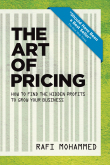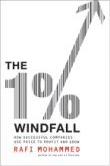Bob Seger...I Loved Your Concert and Learned From Your Pricing Strategy!
Over the weekend, I went to see Bob Seger and the Silver Bullet Band at the "new" Boston Garden (now in its third corporate iteration, it’s officially known as the TD Banknorth Garden). At 61 years old, Bob still puts on a rocking show chock full of hits. Like my fellow fans at the sold out concert, I shouted out the lyrics to Sunspot Baby and did my best “white man’s overbite” dance to Katmandu.
But throughout the concert, something was nagging at me…I couldn’t let go and fully enjoy the show. On the chilly walk home…it hit me: I could not make sense of Bob Seger’s ticket pricing strategy. Mr. Seger priced each of the 19,000+ tickets (which quickly sold out) in the Garden at the same price, $72. The best seat cost the same as the worst seat in the house. As devotees of value pricing, we all know that fans value front row center seats more than last row balcony ones. Scaling the house (setting high prices for the most desirable seats and lower prices for remaining seats) even benefits some fans. Setting a price below $72 for less desirable seats would lower the financial burden of attending a concert.
Confused, I called some of my friends in the music industry to better understand what was going on with Bob Seger’s pricing. After presenting a long winded explanation of my various pricing theories, one music executive half-jokingly screamed “Rafi, Rafi, Rafi…You have to quit being so rational…this is the music business!”
But what emerged from my conversations with concert industry veterans is a very rational explanation for Bob Seger’s “one price” ticket strategy. Bob is a blue collar guy who depended on blue collar fans for years – he is grateful to them. But why not scale the house I pressed, a lower price would give some of his more budget minded fans the opportunity to see the show. What kept coming up in my conversations were the goals of keeping shows affordable for fans and notion of egalitarianism. Seger and his management want to keep tickets affordable (since most shows instantly sold out, that’s evidence they could have charged a higher price). The idea of egalitarianism comes from the fact that money does not dictate who is in the first or last row. When tickets go on sale, it’s truly a lottery. Sure some people line up at the box office to get an edge on better tickets. But my hunch is most fans remain in the comfort of their homes and participate in the ticket lottery by calling phone centers and/or trying their luck on TicketMaster’s web site.
Remember, I’ve never said you have to profit maximize…I maintain that you’re entitled (and it’s okay) to fully profit from the value you create. Could Mr. Seger have made more profit from his concerts? My guess is yes. But his goals are different – he clearly is having a great time on stage and his one price ticket strategy accomplishes his desire to keep tickets affordable and make seating egalitarian for his fans.
Have a question or comment, please feel free to send them to me! I update this blog three times a week – please consider signing up to be notified by e-mail of a new blog post.





Rafi, Rafi, Rafi----Smile pretty and shake hands with Mr. Reality. The only people who are able to buy tickets online to extremely popular concerts are ticket scalpers, with their special computer programs to keep trying, and trying, and trying, and buying, and buying, and buying, until the tickets are GONE (probably a mere minutes after going on sale). I have known people who tried to get tickets that went on sale at 10 a.m. on a Saturday (not for a Bob Seger concert, something else). My friends began trying to buy the tickets at 10 a.m. on the dot. They were unable to get through, either by computer or telephone, and by 10:20 a.m., the ticket seller's website announced that the concert was "Sold Out." Soon thereafter, the ticket scalpers began listing the tickets at three to ten (yes, ten!) times their face value. If Bob Seger and other musicians want to remain true to their roots by setting ticket prices low, they should also insist that their ticketing agent limit the number of tickets that can be purchased on the same credit card. Of course, that probably wouldn't slow down the big ticket scalping operations all that much, but it might, at least, edge out the small-time operators. (Can you tell that I don't like ticket scalpers very much?) Setting the same ticket price for every seat in the house benefits the ticket scalpers more than anyone else, because you can bet that the ticket scalpers will charge more for front-row seats than for the nosebleed section. Of course, I suppose there is nothing to stop these rock stars from investing in a ticket scalping company and profiting behind-the-scenes while getting props up-front for their supposedly "egalitarian" pricing practices. I wonder if anyone actually does that? Your cynical friend in Washington, D.C., Deborah